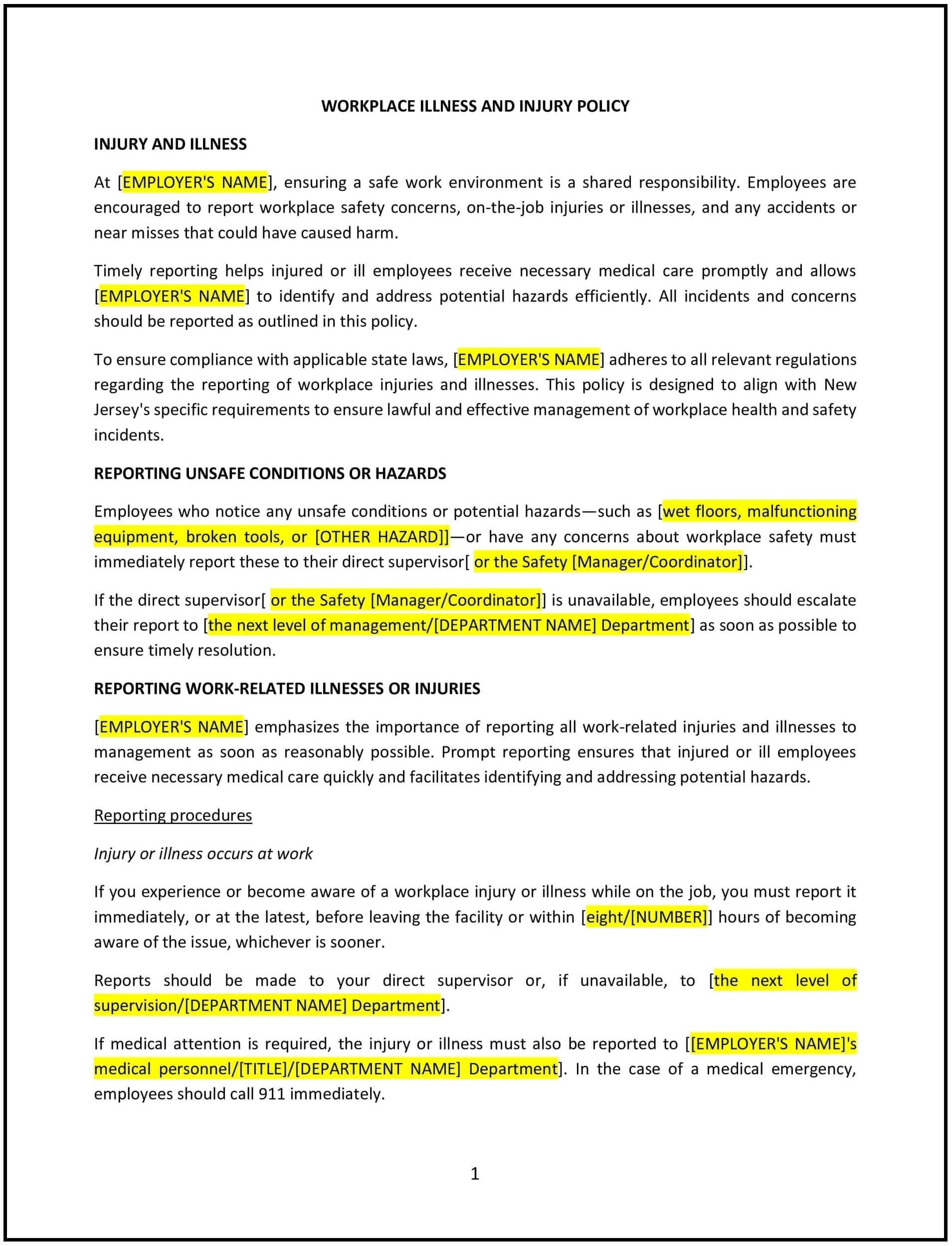Workplace illness and injury policy (New Jersey): Free template
Got contracts to review? While you're here for policies, let Cobrief make contract review effortless—start your free review now.

Customize this template for free
Workplace illness and injury policy (New Jersey)
A workplace illness and injury policy helps New Jersey businesses establish clear guidelines for managing and responding to workplace-related illnesses or injuries. This policy outlines the steps for reporting, documenting, and addressing workplace injuries and illnesses, and provides the necessary support to employees affected by such events.
By adopting this policy, businesses in New Jersey can protect their employees’ health, ensure proper handling of injuries or illnesses, and maintain a safe working environment.
How to use this workplace illness and injury policy (New Jersey)
- Define illness and injury: Clearly define what constitutes a workplace illness or injury, including physical injuries, illnesses contracted at work, and any work-related health conditions.
- Set the reporting process: Outline the procedure for employees to report injuries or illnesses as soon as they occur, including who to notify, the information required, and the timeline for reporting.
- Specify documentation requirements: Clarify the documentation required to report a workplace illness or injury, such as accident reports, medical records, or a doctor’s note.
- Establish medical care procedures: Provide guidelines on accessing medical care, including whether employees are required to seek medical treatment, whether they can visit their own doctor, or if the company provides specific medical services.
- Address paid vs. unpaid leave: Define the policy for leave related to workplace illnesses or injuries, including whether the leave will be paid or unpaid, and whether employees can use accrued paid time off (PTO).
- Outline return-to-work procedures: Set expectations for employees returning to work after an illness or injury, including whether they need to provide a medical release or undergo a fitness-for-duty assessment.
- Implement workplace safety measures: Include steps the company will take to prevent future illnesses or injuries, such as safety training, equipment maintenance, and health screenings.
- Review and update: Regularly assess the policy to ensure it reflects New Jersey regulations, industry best practices, and company needs.
Benefits of using this workplace illness and injury policy (New Jersey)
This policy provides several benefits for New Jersey businesses:
- Protects employee health: Establishes clear guidelines for addressing workplace illnesses and injuries, supporting employee recovery and health.
- Reduces legal risks: Helps businesses comply with New Jersey’s workers' compensation laws and reduces the risk of lawsuits related to workplace injuries or illnesses.
- Enhances workplace safety: Promotes a culture of safety by setting expectations for reporting injuries and preventing future incidents.
- Supports employee well-being: Provides clear steps for employees to take in case of illness or injury, showing that the company cares about their health and well-being.
- Improves business continuity: Helps manage workplace disruptions by providing a structured process for addressing absences and supporting employees’ return to work.
Tips for using this workplace illness and injury policy (New Jersey)
- Communicate the policy clearly: Ensure that all employees are aware of the policy and know how to report injuries or illnesses promptly.
- Encourage prompt reporting: Stress the importance of reporting any workplace illness or injury immediately to prevent complications and ensure timely assistance.
- Maintain records: Keep accurate records of all reported illnesses or injuries and any medical treatment or leave taken to stay organized and ensure compliance.
- Review safety protocols regularly: Continuously assess and update workplace safety measures to minimize the risk of illness and injury, fostering a safe work environment.
- Offer support for affected employees: Provide employees with the necessary resources, such as health care support or assistance with returning to work after an injury.